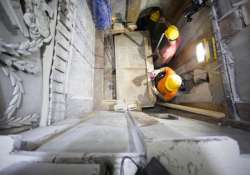Jesus Christ’s burial slab uncovered for first time in centuries
For the first time in centuries, researchers have uncovered a stone slab in Jerusalems Church of the Holy Sepulchre, which is traditionally considered venerated as the resting place of Jesus Christ, a media report said.

For the first time in centuries, researchers have uncovered a stone slab in Jerusalems Church of the Holy Sepulchre, which is traditionally considered venerated as the resting place of Jesus Christ, a media report said.
The slab, which has been covered by marble cladding since at least 1555 A.D., has been exposed as part of a major restoration project at the church, according to the National Geographic magazine.
"The marble covering of the tomb has been pulled back, and we were surprised by the amount of fill material beneath it," Fredrik Hiebert, archaeologist-in-residence at the National Geographic Society and a partner in the restoration project, told the magazine.
"It will be a long scientific analysis, but we will finally be able to see the original rock surface on which, according to tradition, the body of Christ was laid."
The rock surface, or "burial bed" was hewn from the side of a limestone cave following Christ's crucifixion, according to Christian tradition.
Christ's resurrection from the dead is a core tenet of Christian belief - the gospels say that the tomb was found to be empty by those who visited it a few days after the crucifixion, Fox News reported.
The "burial bed" is now part of a small structure called the Edicule in the Church of the Holy Sepulchre, the National Geographic said.
The Edicule, rebuilt between 1808 and 1810 following its destruction by fire, is being restored by scientists from the National Technical University of Athens. The restoration, which includes the Edicule's interior tomb, is being overseen by the National Technical University's Chief Scientific Supervisor Antonia Moropoulu.
"We are at the critical moment for rehabilitating the Edicule," Moropoulou told National Geographic, adding "The techniques we're using to document this unique monument will enable the world to study our findings as if they themselves were in the tomb of Christ."
National Geographic added that after the marble slab was removed, a grey-beige stone surface was exposed. Scientists will use monitoring tools to study the surface.
(With IANS inputs)